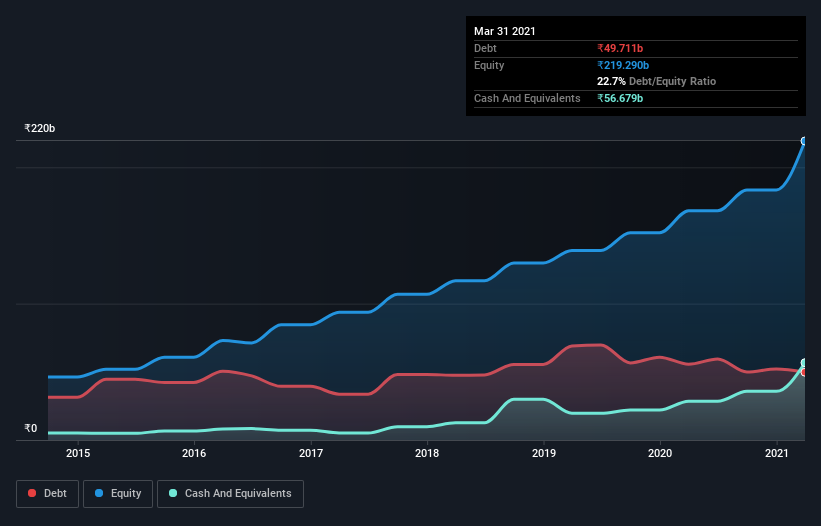
Some say volatility, rather than debt, is the best way to think about risk as an investor, but Warren Buffett famously said that 'Volatility is far from synonymous with risk.' When we think about how risky a company is, we always like to look at its use of debt, since debt overload can lead to ruin. We can see that Aurobindo Pharma Limited (NSE:AUROPHARMA) does use debt in its business. But should shareholders be worried about its use of debt?
Why Does Debt Bring Risk?
Debt is a tool to help businesses grow, but if a business is incapable of paying off its lenders, then it exists at their mercy. If things get really bad, the lenders can take control of the business. However, a more usual (but still expensive) situation is where a company must dilute shareholders at a cheap share price simply to get debt under control. Of course, the upside of debt is that it often represents cheap capital, especially when it replaces dilution in a company with the ability to reinvest at high rates of return. When we examine debt levels, we first consider both cash and debt levels, together.
View our latest analysis for Aurobindo Pharma
What Is Aurobindo Pharma's Net Debt?
You can click the graphic below for the historical numbers, but it shows that Aurobindo Pharma had ₹48.6b of debt in March 2021, down from ₹55.6b, one year before. However, its balance sheet shows it holds ₹56.7b in cash, so it actually has ₹8.08b net cash.

How Healthy Is Aurobindo Pharma's Balance Sheet?
We can see from the most recent balance sheet that Aurobindo Pharma had liabilities of ₹106.7b falling due within a year, and liabilities of ₹12.6b due beyond that. On the other hand, it had cash of ₹56.7b and ₹35.2b worth of receivables due within a year. So its liabilities total ₹27.4b more than the combination of its cash and short-term receivables.
Of course, Aurobindo Pharma has a market capitalization of ₹564.7b, so these liabilities are probably manageable. Having said that, it's clear that we should continue to monitor its balance sheet, lest it change for the worse. Despite its noteworthy liabilities, Aurobindo Pharma boasts net cash, so it's fair to say it does not have a heavy debt load!
The good news is that Aurobindo Pharma has increased its EBIT by 8.6% over twelve months, which should ease any concerns about debt repayment. When analysing debt levels, the balance sheet is the obvious place to start. But it is future earnings, more than anything, that will determine Aurobindo Pharma's ability to maintain a healthy balance sheet going forward. So if you're focused on the future you can check out this free report showing analyst profit forecasts.
Finally, a business needs free cash flow to pay off debt; accounting profits just don't cut it. While Aurobindo Pharma has net cash on its balance sheet, it's still worth taking a look at its ability to convert earnings before interest and tax (EBIT) to free cash flow, to help us understand how quickly it is building (or eroding) that cash balance. In the last three years, Aurobindo Pharma's free cash flow amounted to 39% of its EBIT, less than we'd expect. That weak cash conversion makes it more difficult to handle indebtedness.
Summing up
We could understand if investors are concerned about Aurobindo Pharma's liabilities, but we can be reassured by the fact it has has net cash of ₹8.08b. And it also grew its EBIT by 8.6% over the last year. So we don't have any problem with Aurobindo Pharma's use of debt. When analysing debt levels, the balance sheet is the obvious place to start. But ultimately, every company can contain risks that exist outside of the balance sheet. We've identified 4 warning signs with Aurobindo Pharma (at least 1 which doesn't sit too well with us) , and understanding them should be part of your investment process.
If you're interested in investing in businesses that can grow profits without the burden of debt, then check out this free list of growing businesses that have net cash on the balance sheet.
If you decide to trade Aurobindo Pharma, use the lowest-cost* platform that is rated #1 Overall by Barron’s, Interactive Brokers. Trade stocks, options, futures, forex, bonds and funds on 135 markets, all from a single integrated account. Promoted
New: Manage All Your Stock Portfolios in One Place
We've created the ultimate portfolio companion for stock investors, and it's free.
• Connect an unlimited number of Portfolios and see your total in one currency
• Be alerted to new Warning Signs or Risks via email or mobile
• Track the Fair Value of your stocks
This article by Simply Wall St is general in nature. It does not constitute a recommendation to buy or sell any stock, and does not take account of your objectives, or your financial situation. We aim to bring you long-term focused analysis driven by fundamental data. Note that our analysis may not factor in the latest price-sensitive company announcements or qualitative material. Simply Wall St has no position in any stocks mentioned.
*Interactive Brokers Rated Lowest Cost Broker by StockBrokers.com Annual Online Review 2020
Have feedback on this article? Concerned about the content? Get in touch with us directly. Alternatively, email editorial-team (at) simplywallst.com.
About NSEI:AUROPHARMA
Aurobindo Pharma
A biopharmaceutical company, engages in the manufacture of generic formulations and active pharmaceutical ingredients in India, the United States of America, Europe, Puerto Rico, and internationally.
Flawless balance sheet and good value.


